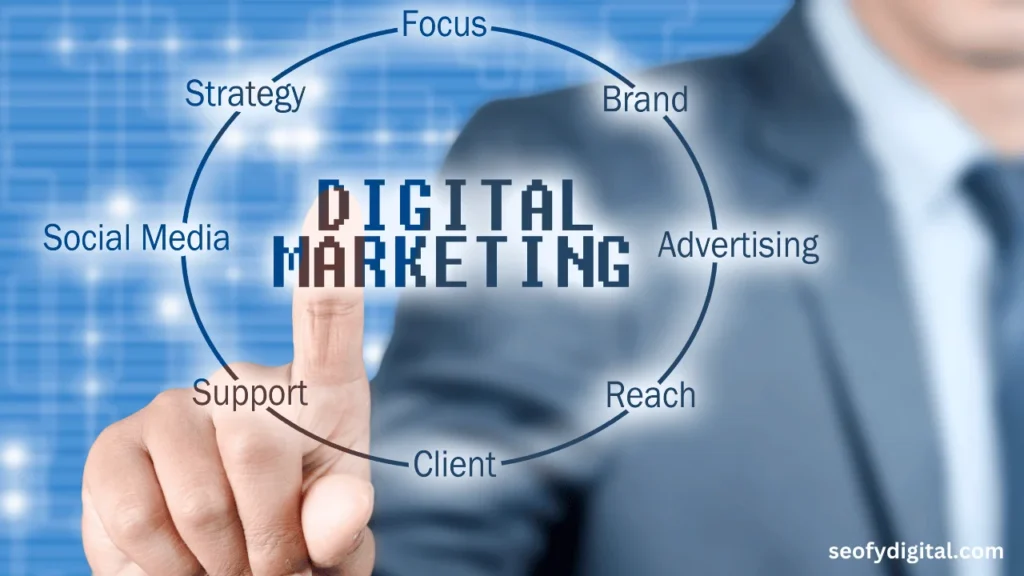Imagine a world where reaching new customers isn’t limited by geography or budget.
A world where you can track the effectiveness of your marketing efforts down to the last click. And a world where you can build genuine relationships with your audience, fostering loyalty and trust. This isn’t a fantasy – it’s the reality of digital marketing.
But with so much buzz around this powerful tool, it’s easy to feel overwhelmed. What exactly is digital marketing, and how does it work? Fear not!
This blog post dives deep into the three core characteristics that define the digital marketing landscape: measurability, interactivity, and global reach. By understanding these key features, you’ll unlock the magic behind digital marketing and see how it can transform your business strategy.
Whether you’re a seasoned entrepreneur or a curious freelancer, this guide will equip you with the knowledge to harness the power of digital marketing. So buckle up, get ready to demystify the online world, and discover the three pillars that can propel your brand to success.
Contents
- 1 Measurability
- 2 Interactivity
- 3 Global Reach
- 4 The Impact of Technology
- 5 Ethical Considerations in Digital Marketing
- 6 Conclusion
- 7 FAQ’s
- 7.0.1 Is digital marketing really that hard to learn?
- 7.0.2 What are the most in-demand digital marketing skills?
- 7.0.3 How can I stay updated with the latest trends in digital marketing?
- 7.0.4 What are the common mistakes people make when learning digital marketing?
- 7.0.5 How can I measure the success of my digital marketing efforts?
- 7.0.6 What is the role of artificial intelligence in digital marketing?
Measurability
One of the defining characteristics of digital marketing is its measurability. Unlike traditional marketing channels, digital marketing allows businesses to track and analyze the performance of their campaigns in real-time.
By using analytics tools, marketers can gain valuable insights into website traffic, social media engagement, email open rates, and conversion rates. This data-driven approach enables businesses to make informed decisions and optimize their strategies for better results.
The ability to measure Return on Investment (ROI) is a significant advantage of digital marketing. By tracking key performance indicators (KPIs), businesses can assess the effectiveness of their campaigns and allocate resources accordingly.
Interactivity
Digital marketing fosters two-way communication between businesses and their customers. Through social media, email marketing, and online chat, businesses can engage with their audience, answer questions, and address concerns promptly.
Social media platforms have revolutionized the way businesses interact with customers. By sharing valuable content, responding to comments, and participating in online discussions, businesses can build strong relationships with their audience and foster brand loyalty.
Personalized marketing is another key aspect of digital marketing’s interactivity. By leveraging data and analytics, businesses can tailor marketing messages to individual customers, increasing engagement and conversion rates.
Global Reach
Digital marketing has broken down geographical barriers, enabling businesses to reach a global audience. With a few clicks, businesses can connect with customers from all over the world.
Localization is crucial for effective global marketing. By tailoring marketing messages to different cultures and languages, businesses can increase their impact and resonate with their target audience.
While global reach offers immense opportunities, it also presents challenges, such as time zone differences and cultural nuances. Businesses must be mindful of these factors to avoid miscommunication and cultural misunderstandings.
The Impact of Technology
Technology has played a significant role in shaping the landscape of digital marketing. Artificial Intelligence (AI) is transforming the industry by automating tasks, analyzing data, and personalizing customer experiences.
Mobile marketing has become increasingly important as more and more people access the internet through their smartphones and tablets. Businesses must optimize their websites and marketing campaigns for mobile devices.
Emerging technologies like Augmented Reality (AR) and Virtual Reality (VR) offer exciting opportunities for immersive marketing experiences. By leveraging these technologies, businesses can create unique and memorable brand experiences.
Ethical Considerations in Digital Marketing

As digital marketing continues to evolve, it’s important to adhere to ethical principles. Data privacy and security should be top priorities for businesses.
Transparent marketing practices are essential for building trust with customers. Avoid using misleading or deceptive tactics, and be honest about your marketing efforts.
It’s crucial to avoid spam and intrusive marketing techniques. Respect your audience’s time and attention by delivering valuable content and relevant offers.
Conclusion
Digital marketing has revolutionized the way businesses connect with their target audience. By understanding the three key characteristics of digital marketing – measurability, interactivity, and global reach – businesses can harness its power to achieve their marketing goals.
As the digital landscape continues to evolve, it’s essential to stay updated with the latest trends and technologies. By embracing innovation and ethical practices, businesses can thrive in the digital age.
FAQ’s
Is digital marketing really that hard to learn?
While digital marketing can be complex, it’s definitely learnable. With dedication and consistent practice, you can master the fundamentals and even specialize in specific areas.
What are the most in-demand digital marketing skills?
Some of the most sought-after skills include SEO, PPC, social media marketing, content marketing, email marketing, and data analytics.
How can I stay updated with the latest trends in digital marketing?
Stay updated by following industry blogs, attending webinars and conferences, and networking with other digital marketers.
What are the common mistakes people make when learning digital marketing?
Common mistakes include focusing too much on theory and not enough on practical application, neglecting to build a strong foundation, and giving up too easily.
How can I measure the success of my digital marketing efforts?
Track key performance indicators (KPIs) such as website traffic, social media engagement, email open rates, and conversion rates. Use analytics tools to gain insights into your marketing performance.
What is the role of artificial intelligence in digital marketing?
AI can be used for various tasks, such as automating repetitive tasks, analyzing customer data, and personalizing marketing messages.








